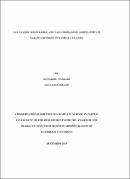| dc.contributor.author | Rutaroh, Paskari | |
| dc.date.accessioned | 2022-04-30T11:06:50Z | |
| dc.date.available | 2022-04-30T11:06:50Z | |
| dc.date.issued | 2018-12 | |
| dc.identifier.citation | Rutaroh, Paskari (2018) Tax payers' knowledge and tax compliance among sme's in Nakawa division in Kampala Uganda | en_US |
| dc.identifier.uri | https://hdl.handle.net/20.500.12504/1013 | |
| dc.description | x,74 p | en_US |
| dc.description.abstract | The purpose of the study was to examine the effect of the tax payers· knowledge on tax
compliance and the objectives included establishing relationship between tax information and tax
compliance; examining the effect of electronic tax filing on tax compliance and examining the
relationship between self-assessment and tax compliance.
This study covered tax payers and Uganda revenue authority officials working in Kampala
district particularly in Nakawa division. Covering compliance levels, administrative issues,
challenges and tax payers' information of tax payers among the SMES. The time considered was
a period of one year of 2018 as a basis of assessment of tax compliance taking a period of six
months commencing April 2018 and ending early October 2018.
Related literature was reviewed according to the objectives. The methodology involved
qualitative and quantitative data used. Sampling method used was probability sampling
technique especially simple random sampling and purposive sampling. Both primary and
secondary data was gathered using questionnaires and interviews and data analyzed using SPSS.
It can be concluded that once the tax payers have the relevant tax information, then they will
comply to pay taxes. It was also that allowing payers to assess themselves gives them the
satisfaction to easily pay on assumption that they have not been cheated hence an increase in tax
compliance. Likewise using the electronic tax filing reduces the time that would otherwise be
spent in movement going to tax authorities and bodies for tax concerns. It also reduces costs on
both sides of the tax payers and tax authority. The researcher recommended that URA should
continue to train people on relevance of paying taxes as well as providing all needed information
to the payers easily as and when needed. URA should also work upon its system to increase its
system speed at which it serves its customer to handle a large amount of traffic at any one given
time. | en_US |
| dc.language.iso | en | en_US |
| dc.publisher | Kyambogo University (unpublished work) | en_US |
| dc.subject | Tax compliance. | en_US |
| dc.subject | Knowledge. | en_US |
| dc.subject | Tax payers. | en_US |
| dc.title | Tax payers' knowledge and tax compliance among sme's in Nakawa division in Kampala Uganda | en_US |
| dc.type | Thesis | en_US |

